<< Previous | Displaying results 171-180 of 312 for "First they came for" | Next >>
The Protocols of the Elders of Zion is the most widely distributed antisemitic publication of modern times. Although repeatedly discredited, it continues to circulate.
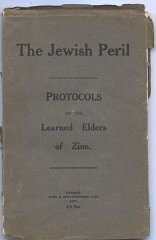
Blanka was an only child in a close-knit family in Lodz, Poland. Her father died in 1937. After the German invasion of Poland, Blanka and her mother remained in Lodz with Blanka's grandmother, who was unable to travel. Along with other relatives, they were forced into the Lodz ghetto in 1940. There, Blanka worked in a bakery. She and her mother later worked in a hospital in the Lodz ghetto, where they remained until late 1944 when they were deported to the Ravensbrueck camp in Germany. From Ravensbrueck,…
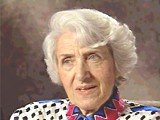
In 1936, David moved to Bucharest to live with his father. As Romania came under German influence, Romanian authorities introduced increasingly harsh measures against Jews. Antisemitic agitation increased and Jews came under attack in the streets of Bucharest and in other public places. David's father decided David should leave the country and arranged passage for him to Palestine. In December 1941, David left Romania from Constanta, a port city on the Black Sea, on the Struma, an old cattle boat. The…
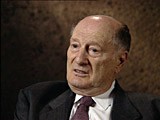
Drexel Sprecher was educated at the University of Wisconsin, the London School of Economics, and at the Harvard School of Law before receiving a position at the US Government's Labor Board in 1938. He enlisted in the American military after the United States declared war on Germany, and was posted to London. After the war, Sprecher served as a prosecutor of Nazi war criminals at the Nuremberg trials.
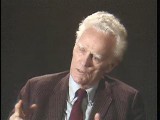
Yennj and her husband Heinrich were two of a few Jewish residents in Ruchheim, a small town in the Rhine River valley. Yennj helped Heinrich run their dry goods store that was on the first floor of their house. In the summer she liked working in the garden out back. Their son, Kurt, had immigrated to America after World War I. Ida, their daughter, helped them in the store until she married. 1933-39: The Nazis have come to power, and many Jews have decided to leave Germany. Yennj and Heinrich's niece,…
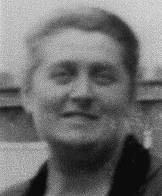
A Jewish merchant, Heinrich ran a dry goods business with his wife, Yennj, in Ruchheim, a small town in the Rhine River valley. Their son, Kurt, had immigrated to America after World War I. Their daughter, Ida, had helped them in the business until she married. The Baehrs' store took up the first floor of their comfortable two-story brick house. In the summer, they enjoyed their garden in the back. 1933-39: The Nazis have come to power, and many Jews have decided to leave Germany. Heinrich and Yennj's…
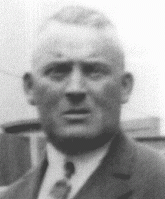
Germany invaded Poland on September 1, 1939. After the German occupation, Sarah (then just three years old) and her mother were forced into a ghetto. One day, a Polish Catholic policeman warned them that the ghetto was about to be liquidated. He sheltered Sarah and her mother first in his house, then in a potato storage bunker, and then in a chicken coop on his property. Sarah hid there for more than two years, until the area was liberated by Soviet forces. After the war, Sarah emigrated from…
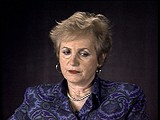
Naftali was the youngest of nine children born to devout Hasidic Jewish parents living in Kolbuszowa. The Germans invaded his town in September 1939 and began to round up Jews. Later, the Gestapo (German secret state police) shot Naftali's father. Naftali eventually made his way to the forest and lived there as a partisan before liberation by Soviet troops in mid-1944. He joined the Polish army, helping to liberate Krakow. He immigrated to the United States in 1947.
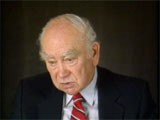
The Germans occupied Krakow in 1939. Murray's family was confined to the Krakow ghetto along with the rest of the Jewish population of the city. In 1942, Murray and a brother were deported for forced labor in the nearby Plaszow camp. In May 1944, his brother was transferred to Auschwitz and Murray was sent to the Gross-Rosen camp in Germany. Murray was later transferred to Bruennlitz, in the Sudetenland, as a forced laborer for German industrialist Oskar Schindler. Schindler helped the Jews who worked for…
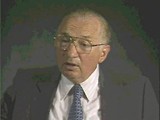
In 1933 Jerry's family moved from Hamburg to Amsterdam. The Germans invaded the Netherlands in 1940. In 1941, Jerry's brother perished in Mauthausen. Jerry and his parents went into hiding first in Amsterdam and then in a farmhouse in the south. The Gestapo (German Secret State Police) arrested Jerry's father in 1942, but Jerry and his mother managed to return to their first hiding place. They were liberated in Amsterdam by Canadian and Jewish Brigade troops.
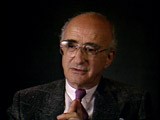
We would like to thank Crown Family Philanthropies, Abe and Ida Cooper Foundation, the Claims Conference, EVZ, and BMF for supporting the ongoing work to create content and resources for the Holocaust Encyclopedia. View the list of donor acknowledgement.